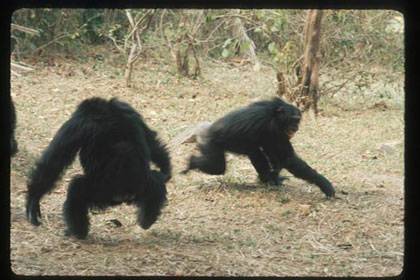
In a long-term study of interactions between chimpanzees in the famous Gombe National Park in Tanzania, researchers have found that males who consistently bully females tend to father more babies with their victims.
"Unfortunately it's true," said Anne Pusey, chair of evolutionary anthropology at Duke University. "But it does help us explain the pattern of male aggression we've seen between males and females in more than 50 years of observation."
Although chimpanzees are genetically the closest relatives of humans, it's important to note that mating behavior varies significantly between our two species, said Pusey's graduate student, Joseph Feldblum, who is the first author on the study appearing Nov. 17 in Current Biology.
"Sexual coercion works for chimpanzees because females mate promiscuously with most of the males in their group during each cycle, leaving males with an incentive to try to constrain female choice," Feldblum said. "But the system that favors male coercion in chimpanzees is less prevalent in humans."
Working with 16 years of daily observational data stored in the Jane Goodall Institute Research Center at Duke, Feldblum wanted to see if males' aggression toward females increases their reproductive success, as has been theorized.
In addition to these painstaking field observations taken almost daily during 12-hour "follows," the researchers have DNA collected from fecal samples since the mid-1990s that allowed them to run paternity testing on the 31 infants included in the study.
Feldblum set up statistical analyses to examine the mating and paternity success of males that were aggressive to females during the swollen (sexually receptive) and non-swollen periods of their cycles in the periods leading up to conception, which ranged from a few months to two or three years.
"We tested whether both short-term aggression (when females were swollen) and long-term aggression (when females were not swollen) influenced mating rates and likelihood of paternity, while controlling for other independent variables that might influence paternity patterns," Feldblum said.
Aggression in chimps can range from chasing and "directed displays," in which a male charges and thrashes vegetation, to serious physical attack including biting and hitting.
"Sometimes they really pound the females, slapping or stamping on them and cause wounds," said Pusey, who did field research at Gombe for many years under the supervision of Jane Goodall.
The researchers found that short-term aggression during a female's swollen, sexually receptive period increased a male's chances of copulation. But surprisingly, that aggression wasn't a predictor of paternity.
What did predict paternity was aggression, particularly by high-ranking males, during the females' non-swollen periods. Long-term aggression in the two- or three-year period leading up to conception resulted in fatherhood.
"Long-term aggression increased paternity success," Feldblum said. “Males that showed more aggression toward females during non-swollen periods were more likely to achieve paternity of those females' infants, and this held most true for the highest-ranking males.”
Independent of aggression rates, rank had a positive effect on the likelihood of paternity, Feldblum said.
"High-ranking males who were highly aggressive toward particular females were much more likely to sire offspring by those females, but rank and male-female aggression had independent effects here," Feldblum said.
The findings support what is known as the "sexual coercion hypothesis."
"It appears that selection favors males who are aggressive toward females," Feldblum said. "If aggression increases their reproductive success, it helps explain why male-female aggression is observed in so many chimpanzee populations.”
This research was supported by the Jane Goodall Institute, the National Science Foundation, the National Institutes of Health, the Carnegie Corporation, the University of Minnesota, Duke University, the Harris Steel Group and the Windibrow Foundation. The article can be read here, in Duke Space, the university's online repository of faculty research.